
55 minute read
The political power of gender expression: Lessons from female dictators
The political power of gender expression: Lessons from female dictators Georgie Cutmore discusses the gendered nature of authoritarian leadership. CW: Misogyny C hina’s three thousand years of written history has seen just one legitimate female sovereign: Wu Zetian of the late 600s. Charismatic and ambitious, she spent thirty years rising through the ranks of concubine, Consort, and Dowager to finally claim official sovereignty in 690. Though posthumously dubbed “Empress”, she styled herself “Emperor” and was keenly aware of the political power at stake in matters of gendered discourse.
As for her own imperial name, “Zhao”, she issued a new Han character, which comprised strokes highlighting the moon, a symbol for the female ‘yin’, and the sun, a symbol for the male ‘yang’. By controlling and rewriting language, she proposed that her position as Empress was a harmonious unification of traditionally male and female strengths.
Advertisement
Wu is not unique among female dictators and leaders in her ardent attention to her own gender performance, and the implications of it. In an era calling for postgenderism and the erosion of binary gender, it is important to recognise and understand the historic, and lasting, phenomenon of gender expression as a tool for political ends.
When asked to call to mind the mental image of a “dictator”, or a “despot”, or an “autocrat”, you’d be forgiven for imagining a moustached middle-aged man, perhaps balding, raising his arm in a military salute. Even the Advanced Oxford Learner’s Dictionary teaches students of English that a “dictator” has often obtained their “complete power” over a country “using military force”.
The tight relationship between the office of dictator and its corresponding armed forces is a historic one and likely needs little explanation. A traditional route to political power has been to rise first through the Was Timmy Chalamet’s face really worth all military or to topple the existing authorities by coup d’état. Dictators then depend on the fuss? military might to assert their regimes; could Isobel Lewis an individual lacking in military experience truly command the full respect and loyalty of Apparently one of those fangirls really does have a telepathic connection with Timmy. How the army? Machiavellian enquiries aside, we begin to see why there have been so few female dictators across history. In the modern era up to the twentieth century, women have usually been excluded from military service, else could the hordes have descended on the Old Bod so quickly? It’s really no wonder that Timmy is famed for his sickly pallor: who wouldn’t look a little pale if an entire student body decided to stalk you en masse for a week? My own smug declaration that I was indifferent to Tim and the flm set did actually hold out for an impressive 24 hours. By the time I succumbed to the fever, though, the Old Bod librarians had unfortunately mastered the art of telepathy too. Those of us who arrived on the pretext of doing work were immediately turned and the field is still overwhelmingly male- away, so I never did lay eyes on the face. You’d think that a velvet-clad man with famously dominated. How, then, we might ask, have prominent cheekbones wouldn’t be so hard to spot really. I guess I missed my chance to fnd the few powerful female dictators and lead- out and now I’ll never know. ers of history come to take up the mantle? Rulers Indira Gandhi (1917-1984) and Aung Zoe Lambert San Suu Kyi (1945-) have much in common. They were both educated at Oxford University, both became prime minister-figures of As one of the privileged few who accidentally caught a feeting glimpse of those delicately chiselled cheekbones and porcelain skin through the iron-wrought gates of the Bodleian; I can attest that the face of Timothee Chalamet was most defnitely not worth the hype. Small in stature and with the look of a rather pale, sickly victorian child about him, he was entirely eclipsed by the magnifcent maroon crushed-velvet coat (which itself did actually warrant the crowds of frenzied students clustered under the bridge of sighs). That said, I don’t begrudge Timmy his moment of striding around rad cam decked in an unearned scholar’s gown. While his face was most defnitely not worth all the fuss, the faces of anticipation and excitement lining broad street could have melted even the stoniest Chalamet-critical heart
Sonya Ribner
Timmy Chalamet must be really charismatic because for an entire week it crossed the English Channel and fooded the hearts, minds, and social media feeds of every Oxbridge student abroad in Europe. Sure, I was physically in Paris, but in spirit I was with my friends who saw Timmy on High Street, at New College, by the Sheldonian. Honestly this is great for us. Good to know that when we’re sneaking friends from other colleges past porters, that we can cite an obvious exception to the “only college members allowed in college” rule. their respective countries, and, crucially, Vlad Popescu were both daughters of previous national leaders – Jawaharlal Nehru of India, and Aung San of Myanmar respectively. This I think Oxford is a model institution for all the wrong reasons - familiar of the microcosm of all the faults and corruption within British politics, the destination of so many after leaving here.
is a well-trodden path. Many of the most culturally famous female dictator figures have come to prominence due to their links with politically powerful men. Eva “Evita” Perón (1919-1952) and Jiang Qing (19141991), known to contemporaries as “Madame Mao”, spring to mind here. The de facto or legitimate reigns of powerful women - Gandhi, Suu Kyi, Perón and Jiang included - have often been directed and overshadowed by the legacies of their male counterparts.
The traditional discourse surrounding women in power has, as such, construed female leadership as rare, and unusual. Women have been painted as dependent upon their powerful husbands or male kin for political legitimacy. Indira Gandhi was dubbed “goongi goodiya” - Hindi for ‘puppet’ - by those who saw her as a weak and easily manipulable figurehead for a male-dominated Congress. Stock archetypes of negative femininity have also been drawn upon to criticise women in power for occupying space in the public sphere.
This goes back to the days of Wu Zetian and beyond. Wu was said to have eaten her own children, and contemporary commentators used her as the basis for pornographic materials, stressing her beginnings as a concubine. She was, essentially, painted as the antithesis of the modest, maternal, ideal woman. Through making such claims to her immorality, her rivals aimed to weaken her political legitimacy. And this treatment is not unique to Wu. A string of female leaders throughout history have been characterised as evil, immoral, and dangerous women.
Given this historic discourse surrounding women in power, it is unsurprising that women seeking power have felt pressure to acknowledge and use their gender in ways that men have not. Perhaps women feel forced to own up to their gender identity before it is seized and turned against them. The famous 1566 Speech to Parliament by Queen Elizabeth I saw her make the following concession: “Though I be a woman, yet I have as good a courage answerable to my place as ever my father had. I am your anointed queen”. While defending her gender, she appealed to traditionally masculine traits and to her paternal family line to claim legitimacy of rule. But she simultaneously asserted the beginning of a new era in which the legitimacy of her rule was tied to her female identity as “queen”. Across various nations, social expectations of what a leader should look and behave like have compiled over centuries and have largely been established from male models. These expectations have firm roots in society. Women have grown up with internalised pressure to conform to these models of ideal power in order to be taken seriously as leaders.
But we also see cases where female leaders have deliberately used performative identity politics to reinforce their own legitimacy to rule. Women have emphasised their “feminine” or “masculine” characteristics to a greater or lesser extent to achieve political ends. Margaret Thatcher’s ‘housewife’ campaign saw her photographed in the kitchen and depicted carrying shopping baskets. She sought to stress her suitability for public life by emphasising that she had the management qualities required to make a good home and to be a good national leader. But, equally, she practised humming exercises and voice training to lower her pitch and develop a distinctive, typically masculine, tone, which might be viewed as more trustworthy. Women in power have often had to broadcast more “masculine” characteristics, and simultaneously weaponise their femininity, for their authority to be taken seriously.
Is this the case in politics today? Must women perform their genders to retain political legitimacy? In my view, the short answer is yes. The gendered insults thrown about in national parliaments – such as Jeremy Corbyn’s “stupid woman” remark about Theresa May in 2018, or, in France last year, the attack on Mathilde Panot as a “fishwife” - suggest that gender, or at least awareness of gender, still plays a large role in high politics. Scholars have pointed out that women in twenty-first-century government institutions sometimes serve a representational function. They are a symbolic presence, seen to stand for all women, and seen to legitimise a government by making it look liberal and democratic.
Women are expected to perform their gender - to visibly make known their “womanness”. The unsaid expectation nowadays is that female MPs speak about and work on the problems which predominantly affect women – such as abortion, domestic violence, and sexual abuse. Female MPs have done just this over the last thirty years and, as such, we’ve seen the privatisation of what counts as “public issues” as well as improvements to the socio-political condition of women more generally. But this phenomenon has also had the unintended function of placing female politicians as singular spokespersons for all “women’s issues”. Current female MPs are expected to act as female politicians, not just as politicians. This pressure is incredibly unfair. It leads to a tendency for generic and angry claims blaming female leaders for not having done enough to help women or focus on “women’s issues”. Where is this pressure on male politicians? Surely these issues should be a focus for all politicians, regardless of their gender.
The ideal situation within high politics would be the complete deconstruction of the gender narrative. This way, women would no longer feel forced to conform to or perform aspects of their gender identity. But this is probably a utopic fantasy. We can hold out hope that, as binary categories of gender continue to be broken down and eroded, it will soon be so normal to have individuals of all genders in power that the public sphere takes on a more genderless climate. But, given the lasting power of using gender expression as a legitimising power tool, it seems unlikely that this will occur any time soon.
Will we see more women in positions of leadership in the future? If current trends are anything to go by, then yes, this is likely. Will we see more women in the office of dictator in the future? This is harder to answer. Dictatorships, to my mind, are never an attractive option. And their historically military nature still excludes women. And in many ways, to back the rise of a female dictator seems a little bit like a toss-up between one’s own ethical ideals and supporting supposed female empowerment.
As we look to the future, and the possibility of more female leaders and dictators, the real point is that we should remember our history. Gender, and gendered discourse, has always been an intrinsic element of politics. We should be aware of performative gender expression in politics and recognise when it is being used, and for what ends.
Science Snippets
New findings published in Nature pinpointed the origin of a recent detection of Fast Radio Burst signals from space to a tight, spherical cluster of stars 12-million lightyears away. This a type of star cluster that typically composes of old stars.
Scientists unearthed the fossils remains of a previously-unknown species of dinosaur: this species of meat-eating dinosaur had puny arms, and were most likely to have used its powerful head to ram its prey.
Tech Tidbits
Russia limits Twitter and Facebook usage in country: Russia is monitoring its citizens’ use of Twitter. Access has been “severely restricted”. VPN services, which circumvent restrictions, are able to be used but can often be expensive and difficult to gain.
Anonymous, cyber-attack group, declare war on Russia in response to the invasion in Ukraine. Anonymous have since tweeted military intelligence from Russia, though it is unclear if the information is correct.
Generation sharent: Are hyper-exposed children the price of social media fame?
Caitlin Wilson discusses the cost of social media fame to generation Z childhoods.
Welcome to the world, Generation Z! Smile for the camera! Your childhood was hyper-exposed. Your young lives were documented via photos and videos, uploaded, shared, liked and commented upon by people you will perhaps never meet. Your parents are so proud of you, and want to share you with the world, but what does that mean for your future?
In the internet’s early years, the emphasis on child protection was placed on limiting what children could see on the internet. Now, the concern has shifted; children are a social media commodity, whether financially or simply within social groups. Their images, names, and locations are often given out freely online by parents without consideration for the potential impact on their future lives and privacy. So ubiquitous is this kind of parental oversharing that researcher Stacey B. Steinberg coined a name for it in 2016: sharenting. Steinberg explores the delicate line that exists between parents’ right to post about their lives online and a child’s need for privacy. The challenge for policy-makers and internet users alike is to decide whether a parent’s desire to share images of their child supersedes the child’s right to privacy. I contend it should not. So, what should be done? Once we can acknowledge it’s gone too far, how can we intervene?
The United Nations Convention on the Rights of the Child recognises in article 16 the importance of a child’s right to privacy, and states
“No child shall be subjected to arbitrary or unlawful interference with his or her privacy, family, home or correspondence, nor to unlawful attacks on his or her honour and reputation.”
In practice, however, individual states’ laws regarding online privacy differ greatly, and most often the nuts and bolts of children’s online access and exposure are decided by the social media platforms themselves. Whether a child is able to access a platform is the purview of the platform’s terms of service, and many rightly have policies regarding gaining consent prior to the uploading of content containing children. However, parent-run social media accounts which centre much younger children are omnipresent on sites like Instagram and Youtube. Instagram and Facebook allow users to choose who sees each post, potentially limiting the audience for pictures of children. Still, this decision is left in the hands of the parents. Mandating that accounts containing the visible faces of children under thirteen – the age of use of most social media sites - must be private would better future-proof children’s privacy.
A further concern comes from ‘sharents’ who are hopeful influencers, enticed by a huge financial incentive should their child become the next internet star. Indeed, one of Youtube’s wealthiest creators of 2019 is an eight-year-old boy who rose to fame by opening children’s toys on camera. Recent discussion surrounding the responsibility of platforms to protect children from exploitation and exposure has centred around this kind of mega-famous child creator, as well as the ‘family vlogger’ genre of Youtube creators and TikTok stars. These channels, while run by adults, primarily draw audiences through filming and posting the daily experiences of their babies or children, sometimes from the second of their birth. These children, it‘s unnecessary to remark, have no say in their participation, while their image is freely disseminated to millions of strangers across the globe. Few would disagree that this is a violation of their privacy, and that their parents’ actions will have a significant impact upon their future employment and, perhaps, safety.
It’s not so simple, however, to villainize every social media parent. TikTok’s Maia Knight began posting videos of her twin girls for her own enjoyment. She likely never expected to grow an audience of 7.6 million followers, who give her children affectionate pet names and call themselves the children’s collective father. While Knight could withdraw from the spotlight and take her children offline, her account is now generating enough of an income that she can remain at home with her children and set them up for a safe, financially stable life. Walking away from this kind of stability is surely not an easy task. While the concerns for the safety and privacy of these young lives remains, my ire resides with the systems that exploit us all, children and adults alike, when it comes to surviving in the digital age, rather than mothers like Knight.
The complex problems brought about by the internet age require nuanced solutions. Ultimately, child content creators should be protected under both privacy and child labour laws in their home country. However, this would require an immense legislative overhaul, and would likely be pushed against by large and powerful corporations behind social media platforms. So what can we push for in the meantime? Many are actively campaigning for social media platforms like Youtube to demonetise content which centres children under the age of thirteen until such legislation can be created. This action would disincentivise over-exposing children for financial gain and would decrease the exploitation of children too young to give their informed consent. Many tabloid websites and magazines are opting to blur the faces of celebrity children to protect their privacy. It is not unreasonable to suggest platforms like Instagram require the same level of protection for ordinary kids in their terms of service.
Social media is real life; the images we share, information we give and discussions we have are part of our life story permanently. While parents‘ desire to share the lives of their little ones are often borne out of the best intentions, a child’s right to determine the course of their lives on their own terms, on-and-offline, should take precedence.
The wonderful world of Oxford’s science societies
Mauricio Alencar explores the range of Oxford societies related to science and technology.
Oxford is today the scientific hub of the world. Need a cure for malaria? Just call Oxford. Need a Covid vaccine to be produced in less than a year? Oxford is the place. In fact, in the technological side of innovation, multinational organisations such as F1 are flocking to Oxford University to offer scholarships and invest in education. So, academics are making groundbreaking strides in innovation and research, but what are the students up to, and how are students connecting with each other? Various Oxford societies exist as a point of reference for socials, for events, and for other career-related activities. How do I connect with other students with shared interests? Here is a summary of 5 Oxford societies:
Oxford University Geological Society
Rocktails may be the go-to event of the year. Unlimited booze for £10 entry for guests. Unreal. The society is chiefly aimed at Earth Sciences students, bringing together a community of earth scientists from different colleges together. However, for the landmark event taking place every term, members of the society can invite friends. They also have positive relations with a number of companies and work with them at an annual Careers Fair. So, what are you waiting for? Get in touch with them, and you will not regret it. Having been to a rocktails myself, I can confirm that the earth scientists are pretty radical.
Oxford MedSoc and Tingewick
Medics have to be friends. At the end of the day, they will be here when we have all left after our third and fourth years of our degrees. Another tight-knit bunch of legends, the medics get up to a bunch of exciting activities, such as Tingewick, an annual pantomime show performed to patients at the JR, fundraising for Oxford Hospitals Charity and Calon Hearts. Oxford MedSoc have also hosted names such as Henry Marsh, who wrote “Do No Harm”, and David Nutt, a drug policy chief. The horizons for medics reach beyond the hospital and doctor-life.
Oxford University Racing Club
This one is for all you motorsport fans. Just this term, the society invited Ryan Walker from the Mercedes F1 Systems Engineering team for a talk. They have also hosted engineers from Williams Racing. The society takes part in the Formula Student racing competition each year, Europe’s most established educational motorsport competition.
Oxford Artificial Intelligence Society
Oxford AI Soc get up to a range of really exciting events. Just this term, they have hosted a project event on AI and Sustainability using OxAI Labs and Dell Technologies, hosted a talk with Ross Upton, Founder and CEO of Ulltromics, and held Themed Discussion evenings in pubs. Blending topical AIled discussions with socials is the future of the typical Oxford society.
Oxford University Nature Conservation Society
Looking for an escape from your degree without going completely off course? Interested in environmental sustainability? This important society, which is ever more important to us in today’s world of climate change and deforestation, holds some fantastic events over the year. This term, they have created a volunteering event in which students joined up with Wild Oxford to clear overgrown fern in Raleigh Park. They have also hosted talks with Peter Shepherd, Director of BSG Ecology, and Rebecca Lent, Executive Secretary of the International Whaling Commission. Topics have included “exploring innovative approaches to collaboration with local communities” and “Global Priorities for Cetaceans: science and stewardship in the face of emerging threats”.
Oliver Bullough on London, thieves, and crooks
The Business Editors report on Oliver Bullough’s views on how London’s financial and legal systems have helped fuel the wealth of Russian oligarchs.
As an unpredictable conflict continues to evolve in Ukraine, the UK government has taken legal measures in quick succession targeting Vladimir Putin’s inner circle and their economic connections to the UK. So far this has included freezing assets of select individuals and Russian banks involved in bankrolling the occupation, imposing travel bans, calling for the removal of Russia from SWIFT, and seizing property.
While the UK government has received praise for these policy moves, they have shined the spotlight on Russian oligarchs and how they have benefited from British financial and legal institutions over the years.
Oliver Bullough, the author of Moneyland: Why Thieves and Crooks Now Rule The World And How To Take It Back, came to Oxford discuss his views on this issue at the invitation of Cherwell and Oxford Finance Society. He moved to Russia in 1999, where he worked as an investigative journalist for Reuters and covered the war in Chechnya. Witnessing firsthand the wealth disparity between the cities and countryside, wars, and human rights abuses inspired his curiosity in its root cause: corruption.
Bullough put Russian inequality into context by pointing out that “the richest 500 people in Russia own approximately more than 99.8% of the population… [today’s Russia] is even more unequal than it was on the eve of the Bolshevik Revolution”. Many of these oligarchs obtained their initial wealth by owning and selling state assets following the collapse of the Soviet Union and/or by maintaining deep-seeded relations with Putin.
When discussing corruption in Russia, its hard to ignore the role that London plays in moving the money. Since the fall of the USSR, elites from its successor nations became clients of financial services firms in London and investors in UK assets. “If you are a Russian oligarch, you have very particular skills…none of those things involve learning how to structure your assets offshore by a series of interlocking extremely complicated shell companies in multiple jurisdictions. You need someone to do that for you”, explains Bullough. These offshore structures are often used by the wealthy who don’t wish to pay taxes or have their identities revealed. Chatham House estimated in 2018 that £90 billion of illicit funds are laundered through London annually. Additionally, reports indicate that £1.5 billion worth of property had been purchased by Russians accused of corruption or with Kremlin links, though it is unclear to what extent this is just the tip of the iceberg.
In addition to not knowing the true extent of what oligarchs own, there is a lack of budget and staff for enforcement agencies like the National Crime Agency (NCA) to tackle this. Its former director-general, Dame Lynne Owens lamented in 2020 in an Intelligence and Security Committee report the difficulties of policing “wealthy people with access to the best lawyers” with the latter knowing well that eventually the NCA would run out of resources to pursue this further.
As for recent government moves to axe incentives like the Tier 1 investor visa scheme and imposing sanctions, Bullough equates it to ““watching the government do too little too late”. However, he insists this is wide-ranging issue and not just Boris Johnson’s fault: “Labour was just as bad… Everyone’s been bad”.
To combat the issue of widespread corruption, he recommends that countries “take this problem seriously and not to just deal with processing suspicious activity reports and nothing happens to them, but actually…study them to prosecute people.” Bullough feels that the UK’s current set of laws are as good as other comparable nations, but issued a warning: “if we’re not prepared to resource the fight against oligarchs… then obviously we’re going to lose.”
Image Credit: Hung-Jen Wu
Inside Nvidia’s failed takeover of Arm
David Rovick Arrojo explores the causes behind this deal’s collapse and its ramifications for the global chip industry.
On the 8th February, SoftBank announced the collapse of Nvidia’s proposed $66bn acquisition of Arm Limited following ‘significant regulatory challenges’. Nvidia, a leading chip designer specialising in processors for gaming and training artificial intelligence, first announced its takeover of Arm, a chip designer whose IP powers the vast majority of the world’s mobile devices, on the 16th September 2020. Over the following year and five months, regulators from around the world expressed concerns over potential monopolistic effects on the global chip design industry posed by the combined entity. After struggling to assuage concerns, both sides mutually agreed to end the deal and trigger an automatic $1.25 bn break-up fee between Arm and Nvidia.
Nvidia’s Graphical Processing Unit (GPU) chips are used in the data centres which power the cloud computing platforms of Amazon, Google, Microsoft, and Alibaba, as well as crypto-currency farms. They also come with a developer-friendly software ecosystem which can be used to squeeze out maximum performance from their designs. Arm specialises in energy-efficient Central Processing Unit (CPU) chips. However, over the last several years, tech companies like Apple and Amazon have announced their own GPU and CPU chips designed to integrate seamlessly with their own hardware and software products, threatening Nvidia’s leading position in the industry. Arm, also threatened by larger tech companies, would have enabled the combined entity to stave off this threat by optimising chip designs to work seamlessly with each other on mobile devices and data centre mainframes. Additionally, Nvidia, whose chips have a reputation for being power hungry, would have benefitted greatly from Arm’s specialism in streamlined, energy efficient chips. Finally, Arm’s prowess in designing ‘light-weight’ hardware custom-built for specific artificial intelligence, IoT and systems networking purposes would have afforded Nvidia the luxury of expanding rapidly into hot market segments by inheriting Arm’s existing integrations with tech ecosystems. For Arm, ownership by Nvidia would allow for the R&D budgets necessary to compete with global chip giants AMD and Intel, the latter of which has struggled to maintain its industry leadership over the last decade. As such, the deal made a lot of sense for both entities.
Regulators and industry leaders ultimately provided great opposition to the deal. Arm licences IP out to hardware product manufacturers and designs chips used in over 95% of the world’s ‘premium’ smartphones, for example, and is therefore seen as integral to the electronics industry. Regulators across the globe were concerned about Nvidia’s ability to control prices of Arm-developed
technology, or even restrict access from their competitors. This would have had an impact upon prices and innovation for endconsumers. Despite this, Nvidia argued that to pursue such an anticompetitive strategy would have been “self-defeating”, resulting in massive losses to Arm’s revenue and
making it much harder to recoup its initial $40bn purchase price. It pledged to keep Arm as an independent entity, but regulatory scepticism ensued. With long delays to
regulatory anti-trust investigations caused by the global pandemic, it became clear that the deal would not obtain approvals needed to reach a close by the hard deadline of September 2022.
The greatest threat to competition for the chip design industry appears to come from end-to-end consumer tech giants such Amazon, Apple, and Google, who favour designing their own hardware to seamlessly integrate with their existing products. It is likely that the Arm takeover would have allowed the chip design industry to compete on equal footing with America’s leading technology companies, thereby offering some buffer to their ever-expanding dominance. While this may have outweighed any potential anti-competitive aspects of the Arm deal, the US regulators nevertheless seemed all too keen to oppose, potentially being aware of the reputational benefits from taking a tough stance on the deal, amidst growing societal divisions over the true cost to society of “unrestrained profitseeking”.
As global connectivity rises, we should recognise the growing importance of the sector in people’s day to day lives. Arm and Nvidia have both continued to grow their revenues, while Arm is looking to debut with an IPO before March 2023. The question of who designs and manufactures our chips will surely be worth paying attention to.
Quick Takes
Describing recent run on the Russian Ruble, “This is a kind of financial nuclear bomb that is falling on Russia.”- Sergei Aleksashenko, former Russian Deputy Finance Minister
“The construction of the Nord
Stream 2 gas pipeline connecting
Russia and Germany has shown how many politicians in the EU are prepared to sell out western values for the chance to make a good deal.” - Mateusz
Morawiecki, Prime Minister of Poland
On Rishi Sunak’s planned £12bn rise in national insurance, “The proposed increase remains illogical and will be even more ill-timed given how circumstances have rapidly changed since it was announced.” - Stephen
Phipson CBE, CEO of Make UK
Masthead

SENIOR EDITORIAL TEAM
Biggest Dick Energy, WhatsApp Screamer, Cherwell Mermaid, Ball Boy, DILF of the People, Drama Queen, Common Grounder, The Long Hauler
NEWS
New era of news, Hack by association, “I know him actually”, Pete Buttigieg, Losing cuppers team
COMMENT
French Son-tana, ‘Spice it up’, also an OSPL boss!, only one with InDesign
FEATURES
I get paid for this at home’, Queen of the edit, ‘What’s happening at History Soc’, Tonsilitis Queen 2.0
PROFILES
Joining from afar, ‘Cherwell Old Hands’, More BBC journalists, Our Danish King
SCIENCE & TECHNOLOGY
The poshest accent in the office, the mad scientist
BUSINESS & FINANCE
Khusrau Islam, Hung Jen Wu
CULTURE
Culcher’s biggest interviewer, the mathmatician who suprises us all, the one who’ll bring down Google
STAGE
Most functional 3rd year, Culture’s most politically informed
FASHION
Cherwell’s roving reporter, The college puffer hatter, One day she’ll report on Japanese style (if she ever makes year abroad)
MUSIC
Radiohead’s top spotify listener, N/A
FILM
Cherwell’s artist in residence, the filmiest of film students
BOOKS
Bookisano, the actual (American) english student
LIFE
average lay in at the airport enjoyer, head of cherpse
THE SOURCE
Most fashionable non-fashion editor, fashionably late, number one fan of pigeons
SPORT
Balliol benchwarmer , Writing addict
FOOD
Queen of PVC trousers, InDesign superstar, @milliedrewfood plug plug plug
PUZZLES
Diolch yn fawr
CREATIVE
Zoe Rhoades, Rachel Jung, Heidi Fang, Benjamin Beechener, Mia Clement
Jill Cushen (she/her), Editor-in-Chief
I write these words after rereading an old essay on the theory of narrative endings. My former self argued that a book, a page, a chapter, all must come to an end, but a narrative is not finite nor does it cease to exist after the final full stop. As soppy as it sounds, that’s a sentiment that Charlie and I will hold onto in our future states of ‘irrelevance’.
Cherwell has completely consumed and shaped my Oxford experience. I’ve met and worked with people who have shaped my life impermeably and forever. Every term, us editors like to joke about what we’ll do to fill the Cherwell void. Spending more time on my degree might be a start but I don’t regret where my priorities have been over the past couple of months.
I wrote in my first editorial that we would inevitably make mistakes. We did. Not many but a few. I’ve realised that some people are not out to get me but out to get someone, and in this position, Charlie and I put ourselves in the firing line. Remember that there are faces behind that C, that we are students just like you, and that every Oxfess will most definitely be seen and oftentimes, taken to heart.
I am immensely proud of what our team has achieved. I often felt like Big Brother
Estelle Atkinson (she/her), Deputy Editor
The only diary I’ve ever kept for more than a few days was during a two week stay at my grandma’s house in the Essex countryside. It was the summer before my first year at Oxford, and my mom and I were staying in a small cabin out in the garden, which had just about room enough for a bed, narrow desk, and two sealed suitcases.
We had spent the earlier part of the summer watching BBC Four’s Detectorists, a television series which follows the Danebury Metal Detecting Club as they trawl the hazily sunny English countryside; it seemed something of a mirage to us. The backlit poppies, recently ploughed fields, and breezy English oak branches sparkled to the tune of the series’ theme song, sung by folk singer-songwriter Johnny Flynn. We found ourselves, in the equally hazy transition from summer into the early, warmer days of Autumn, faced with the opportunity to live as buoyantly as the poppies, with Johnny Flynn playing in the background.
Where we might have enjoyed an incredibly unstructured couple of weeks, we found ourselves rigidly following the schedule of the ocean’s tide. A short drive away from my grandma’s house is Brightlingsea Beach, which features a pool refreshed by the high tide, a small harbour for paddle boats and the more irritating jet skis, and sandy watching over our staff, keeping an eye on every group chat and only butting in when there was a problem. But I know how hard everyone worked and am grateful for all your contributions.
The senior editorial team has been magnificent. Not only are they an incredibly hard working bunch but we laughed a lot and it’s been a pleasure working with such a ‘fit’ team. I’m so proud of all of you and I hope that we did you proud as your leaders.
Finally, to my partner in Cherwell crime, the person I spoke to more than anyone else this term, Charlie - this has been a rollercoaster, but it’s been wonderful experiencing it with you - all of our late night calls, the much-needed rants, our choffice hysteria. It has been such a privilege working with and learning from you!
It’s been amazing and agonizing. I’ve hated it and I’ve loved it. Cherwell, thank you for having me.
ful people on this masthead. It has been an honour to work with you all, and I am so proud of you: from the new recruits who have learned on the job with aplomb, to the old-hands who have become perceptive editors and fearsome reporters.
A special mention must go to our team of deputy editors, who have brought their dedication and creativity to the table every week. Jill and I could not have done it without you.
Jill. I could write a whole other editorial about how much I have loved working with you since we met on the news team last year. You have been an indespensible comrade and friend, and I will treasure the time we have spent together. This job can be stressful at times, but it is the people who get you through those late nights.
I know the paper will be in safe hands with Maurício and Estelle at the helm, leading a new team of trusty deps, steering this historic paper onwards.
stretches until the sand turns to mud. In terms of swimming, most locals - and the swimmers are mostly locals - favour Splash Point: a series of concrete steps leading down to a deeper descent into the groynes, aptly named, as the water splashes over the sea wall on choppy days.
Open water, and specifically cold water swimming, has recently seen a surge in popularity, a trend which has also inspired a number of students here in Oxford to take it up in Port Meadow, and Hinksey Lake. The swims are organised in such a fashion as to bring like-minded people together. This usually occurs through Facebook groups. My mom and I, however, showed up for our first swim at high tide to find a group of swimmers - primarily women, primarily older - frolicking, for lack of a more accurate word.
Splash Point is unswimmable when the tide is low and the mud flats are left exposed, leaving a comfortable hour of swim time once each day. We quickly realised that despite the lack of formal organisation, this group
of swimmers was a community united in their shared tidal-centric schedule. After a few days, we began to talk with some of the women. They revealed that they had been making up stories about me and where I maybe came from. Thereafter, each high tide we would be greeted with the same warm “hi ladies!” And after every swim, my mom and I
Charlie Hancock (she/her), Editor-in-Chief
I arrived at Oxford knowing that I wanted to edit Cherwell. I knew I wanted to be a journalist, so joining Oxford’s leading newspaper was a no-brainer. I attended my first news meeting zoom before term had even begun. Seeing my name in the 0th week edition of MT20 felt like I had made a little mark on this city.
The paper became a joyful constant in my life, and some would argue my entire personality. My year on staff at Cherwell has been full of surprises, and surreal opportunities. Looking back on it, it has been a catalyst for immense personal growth, alongside professional advancement.
Jill and I knew we wanted to change things under our editorship. I’d say we’ve achieved our goals, and I’m proud of what the paper has become. we wanted to make our articles more relevant to the Oxford community; we wanted to bring some bite to our comment and features; and we wanted to make our news coverage more ambitious. We’ve taken bigger risks, and ruffled a few feathers in the process. But we seem to have stuck the landing.
Journalism is about people. People at the irworst and their best. My time at Cherwell would not have been what it was without the wonder-
would stop by the beach cafe for a bacon bap and hot chocolate, which became more and more welcome the faster the water’s temperature dropped. Everyday my diary read: “swimming again with the high tide ladies.”
As the days went on, fewer swimmers showed up. There were tides where we had the stretch of sea all to ourselves, and comments from chilly passersby - “warmer in there I reckon!” - were frequent. The same person had been serving us our bacon baps and hot chocolate each day, and she began to question our persistence as October neared. On our last day in Brightlingsea, she greeted us: “hello! I knew you crazy ladies would come!” to which we had to bid her a sad goodbye.
I had returned for solo visits, and swims, throughout the following year, but it was only over a year later that my mom and I returned together. Still with Johnny Flynn playing in the hire car, we made our way to an early morning high tide at Splash Point. This time, the memory of summer did not linger; it was undeniably winter. The water was so cold it was painful, and we only managed to immerse ourselves for a minute or so. While there was no crowd of swimmers, immediately we recognised a couple of our friends from the summer before last. I could tell that they didn’t recognise us. Still, the women introduced themselves, unknowingly, for a second time. They were as cheery and welcoming as when we first joined the high tide swimmers, and we never corrected them. Instead, I silently swelled with an immense gratitude for the tide, for both continuing to come in and for continuing to create joy in its purest form, like clockwork. I am content that if I were to swim tomorrow, at high tide, I would most likely find a friendly face that knew and understood how the sea guided me throughout some of the most peaceful and reviving weeks I’ve lived so far.
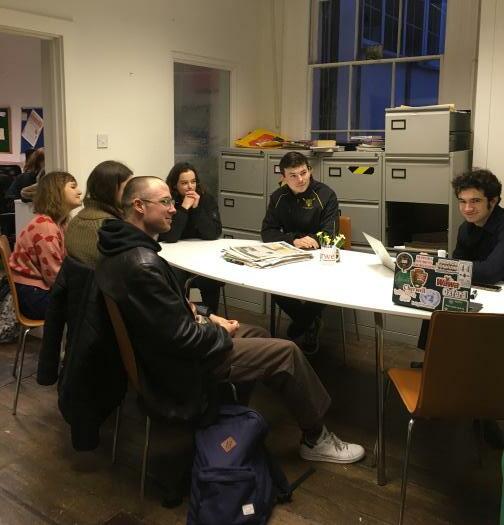

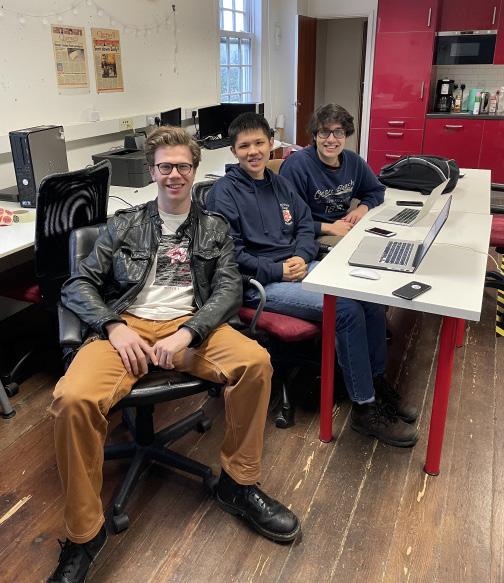
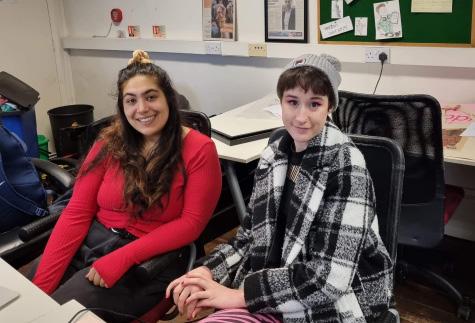



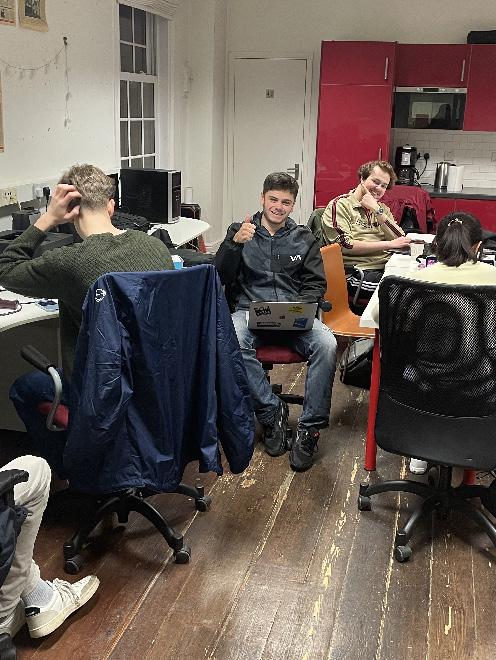



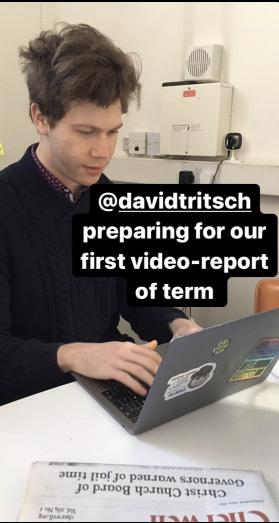


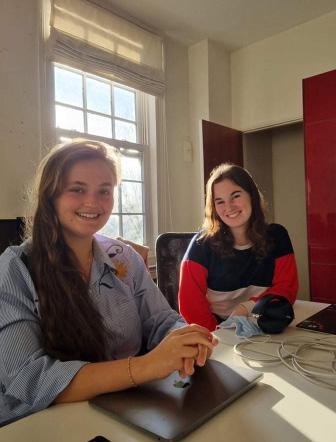





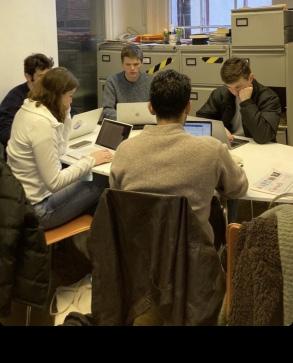



CONTENTS
CULTURE 12 | Switiching Big Tech off and on agian 13 | In conversation with Katie Melua
MUSIC 14 | ‘Stirred to breathless heights’: Wolf Alice Concert Review
FILM 15 | ‘The fairest of them all?’: Hollywood’s problem with visually represented villainy
THE SOURCE 16 | Prophecy by Aaron Low
BOOKS 18 | Rubbish representation in schools, syllabus and beyond
STAGE 19 | Reviews: The Dumb Waiter & Brain Freeze
FASHION 20 | Cherwell’s 70’s How To Guide
FOOD 22 | Setting the bar high: On running the college bar
COVER PHOTOS

This paper, our fnal print edition of Hilary Term 2022, marks the end of our staff’s time in their current roles, and for many people, the end of their time at Cherwell. To commemorate a stellar term of journalism, laughs, lay-ins and Choffce antics, this week’s cover features a collage of our most cherished moments from the past term!
Exploring a new beginning for tech ethics
Anna Mayer reflects on the Institute for Ethics in AI’s colloquium in partnership with TORCH.
Since the Cambridge Analytica scandal broke in 2018, it has become apparent that we have reached a tipping point in our relationship with the tech industry – a point where the interests of tech giants and the customers they are meant to serve are no longer aligned. In fact, they are radically misaligned. The utopian vision for a future in which technology would inevitably make the world better, safer, and more prosperous has given way to a distinctive brand of nihilism, wherein our future is at the whim of the technologists who designed it, the venture capitalists who fund it, and the politicians who allow it to continue unchecked. We have, almost all at once, become aware that what hides within these shiny interfaces is the erosion of privacy, the rise of populism, the degradation of our well-being, and the dissolution of the very fabric of our democracy. We now stand in the middle of a full-blown tech-lash.
The Institute for Ethics in AI, part of the Philosophy Faculty here at the University, brings together world-leading philosophers, and other experts in the field of the humanities, with those developing and using artificial intelligence in the arenas of academia, business and government, in order to navigate this cultural moment. They aim to enhance the quality of public deliberation concerning the ethi- c a l implications of these digital technologies with such profoundly world-changing potential. I attended the first of their online events in Hilary term – a collaboration between the Institute and the Philosophy, Law and Politics Programme, the livestream was a book discussion of System Error: Where Big Tech Went Wrong and How to Reboot, the manifesto of three Stanford professors: Rob Reich, Mehran Sahami and Jeremy M. Weinstein.
The book exposes our current predicament – the authors point the finger at behemoths like Google, Facebook, Apple and Amazon who have sacrificed fundamental human values on the altar of optimisation and efficiency. They reveal the way in which big tech worships the ability to grow fast and scale endlessly with no sense of either social responsibility or ethical rigour. As a result, we see current and potential ethical crises raised left, right and centre, by notions of consumer privacy and surveillance; bias, discrimination and injustice in algorithmic decisioning; and existential threats posed by artifical intelligences. This extends to even more tangible problems, such as job displacement resulting from machine-learning and robotics, and even computing’s increasingly ruinous effect on our habitable environment. Predictive policing and facial recognition technologies, voter profiling and autonomous vehicles encroach upon us, alongside more insidious threats to human well-being such as the treatment of human attention as a scarce commodity, the pervasiveness of ‘always-on’ culture, and the evergrowing pressures to compete in constant information provision and consumption.
Big tech companies have only very recently begun to reckon with these moral implications of their products – or rather, attempt to project the appearance that this kind of reckoning is taking place. It would not be unfair to say much of the work of tech ethicists is not measurable, actionable or even useful within the context of the tech industry’s existing practices and priorities. Ethical principles are very rarely translated into the practical and tangible language of business. They fundamentally lack any institutional framework. In this sense, it is far too easy for the tech industry to avoid taking responsibility for creating, applying and regulating their products ethically. Tech’s enthusiasm for ethics paraphernalia is often merely ‘ethics washing’ – an elaborate strategy to deflect criticism and dodge censure. For example, Google formed a nominal AI ethics board in 2019 with no actual veto power at all. And so, for all the lip service paid to these problems, the ethics guidelines of many organisations remain vague, indistinct, and incredibly hard to implement. Organisational practices are ignored; checklists, procedures and evaluative metrics are abandoned in favour of platitudes and truisms contained in buzzwords, slogans and hollow sentiments. The phrase ‘don’t be evil’ is, quite ironically, one of the cornerstones of Google’s corporate code of conduct.
Indeed, those within the microcosm of the tech industry remain generally reluctant to pass the baton to ethics and philosophy as a specialised domain. Optimisation culture is a key motif of System Error, and, indeed, ethics are often viewed with an eye toward smarter, better, faster, optimised approaches. Many within the tech industry position themselves as those best suited to tackle ethical challenges in the most optimised way, rather than less technologicallyinclined stakeholders, such as elected officials or advocacy groups. (They wouldn’t be entirely mistaken – take, for example, the comical levels of complete cluelessness demonstrated by US lawmakers during Mark Zuckerberg’s congressional hearings in 2018.) Engineers are trusted to discern the ethical stakes of their own products, and thus digital technologies are granted exemption from the scrutiny of democratic processes. Technological solutionism recasts complex social phenomena as neatly defined problems with definite, computable solutions or as straightforward and self-evident processes that can be easily optimised. The work of the industry consistently and constantly falls short of the reality of its ethical crisis.
The technology-market link has fuelled a growth trajectory the industry is attempting to ruthlessly ride to ever-rising levels of profitability and prosperity. The quest for rapidly growing revenues, shareholder returns and stock prices pushes tech companies to accelerate innovation without properly considering its consequences. And while the notion that tech companies will choose profit over social good in every instance is a misconception, it is indeed the case that the organisational resources necessary for morality to win out need to be justified in market-friendly terms. In this respect, it is undeniable that the market sets the terms of the debate. The process of avoiding measurable downside risks and promoting the upside benefits of more ethical technologies is certainly onerous, and market fundamentalism always comes out on top. Moral victories can often look like failures and ethically questionable products generally earn big bonuses. As such, technological innovation finds itself, more often than not, driven by greed – and thus the move to prioritise ethical action within technological innovation is a moral imperative. All at once, it is becoming apparent to us that big tech firms should be implored to prioritise their impact on users, regardless of profit potential.
Reich, Weinstein and Sahami are standing right at the centre of this collective cultural moment of realisation. Understanding the nuances of the transforming effects – for better or worse – of the tech industry at the social and political level is, as the Institute for Ethics in AI understands it, truly ‘urgent and important work’. There is still hope, though, that we can cultivate an ethic of responsibility and accountability within the industry. System Error isn’t a diatribe against technology. Rather, it’s a truly hopeful call for the vindication of tech from this cesspit of ethical ignorance, offered in the optimistic spirit of anticipated liberation. It certainly does not deny the often ruthless monopolistic dominance exercised by the tech industry and its sense of profound social irresponsibility. The positive message of the book, though, is the possibility of the democratisation of the technological choices that will invariably affect our future. The digital economy can be brought under democratic control! This democratisation begins with us making these valuable connections between the seemingly self-contained universe of the tech industry and the wider world. Each of us can be, as Reich, Sahami and Weinstein put it, ‘enablers and shapers of technological change in society’. In their view, a democratically controlled and socially owned digital economy is not a pipe dream, but rather a very achievable goal for tomorrow’s technologists and users alike. We may live to see the day where digital infrastructure becomes something which prioritises not profit, but public good.
The power of positive voices: In conversation with Katie Melua
Clementine Scott & Jimmy Brewer speak to Katie Melua about songwriting, Silk Roads, and her new series of workshops for students.
Where do we come from? I mean, where does it all come from, all this? – the books that we read or skim; the computers that we frantically tap; the cultural values that press upon us in every decision we make? Some would posit the Egyptians, Greeks and Romans as the progenitors of our western society. Stories of names like Cleopatra, Socrates and Caesar abound in British accounts of ancient history, at least. However, Peter Frankopan, author of The Silk Roads: A New History of the World, points to Persia – loosely corresponding today to Iran and the -stan countries – as the bubbling cauldron from which much of the modern world emerged.
Indeed, this book and its particular rewriting of history sits at the heart of a collaborative project here in Oxford with Georgian-born singer-songwriter Katie Melua. In the coming weeks, she will be leading a series of songwriting workshops for students that will culminate in a concert at the Sheldonian in April. We recently had the opportunity to speak to Katie about the project.
When asked about her hopes for the workshops, Melua says that she wants first and foremost to ‘put on a beautiful show in April, with some exquisite pieces and songs; original songs that are written by the students.’ Her longer-term – and more grandiose – aim is to ‘create real deep interest in the art of songwriting from a lyrical point of view, not just a musical point of view.’ How will she know when this lofty goal has been realised? When, ‘in 10 to 15 years’ time,’ she ‘walk[s] into a store, perhaps at Christmas time, and hear[s] really great, uplifting, meaningful pieces of music, that aren’t just repeating the same, you know, over and over.’
If you do not already know who she is, Katie Melua is a musician who has achieved vast commercial success – in 2006 she was the UK’s best-selling female artist. She saw precocious fame when, at just 19, her debut topped UK album charts. Today, she is 37 and has released eight albums. Her songs are characterised by her rich singing voice and easy-listening arrangements that tussle with the sentimental.
‘One of the things that I’d like to focus on is a lyrical duty of care,’ Melua tells Clementine. She cites artists who she believes have this ‘duty of care’ – that she looks to cultivate in her workshops – in their lyrics: Joni Mitchell, Nick Cave, PJ Harvey. Melua remarks that in song – a performed medium – effective lyricism is constituted not just by the choice of words, but by a myriad of other adjacent linguistic considerations: dialect, intonation, pitch, pacing and accent. She is concerned about the neglect of these aspects in songwriting. ‘In the circles I have worked in, there is a much greater emphasis on musical writing than there is on the lyrical writing.’ Melua seeks to balance these two aspects of composition in these workshops, moving towards a lyrical ‘fluidity’ that she believes can sometimes go missing in a song. It is the book The Silk Roads that has been chosen to inspire lyrical ‘fluidity’ and focus in the sessions. According to TORCH’s website, the book will aid participants ‘to write songs that explore journeys through time, geographies, and cultures.’ It seems a somewhat arbitrary choice of text – a tribute to the ‘humanities’ that the project must, perhaps artificially, incorporate. I have no doubt, though, that its author Peter Frankopan, Worcester College historian, will be pleased.
‘I hadn’t actually heard of the book until I started these talks with TORCH,’ Melua says, though is flexible in adapting to its suggestion. ‘I started reading it, and I thought it was phenomenal,’ she recounts, with adequate emphasis. Melua’s natural flair for displaying enthusiasm shines through in her answer here. She makes links to Georgia, the country in which
she lived until she was eight, which lies precisely on the Euro-Asian trading routes that give Frankopan’s book its title. Melua then drifts into childhood reminiscences: ‘music was everywhere in Georgia,’ which meant she was able to move to the UK ‘…with great excitement, because it was the country where The Beatles and Led Zeppelin were from.’ Her story gleams against the backdrop, provided by Silk Roads, of crosscultural journey-ing and migration. We finished by asking Katie what words of wisdom she has to impart “Katie Melua’s project on the young creatives on the programme. Melua wants to make them is tangible, whilst aware of their ‘voices of influence’, by which she means the plethora maintaining grand of accents and vocabularies and vocal pacings that we encounter every vision. Its seeds are day. These could be singers – Melua credits Bob Dylan and Joni Mitchell as promising, and may having influenced her inner ear – or just the talk we overhear. ‘There can be flower into a thing of positive voices of influence, and negative ones,’ she says, going on to give an anecrare beauty.” dote about a manager of hers from whose mouth perennially comes the word ‘dude’. ‘Since working with him, I always use the word dude, too,’ she admits. Katie Melua’s project is tangible, whilst maintaining grand vision. Its seeds are promising, and may flower into a thing of rare beauty. Whether in 10- or 15-years’ time we will walk into a store – perhaps around Christmas time – and hear really great, uplifting, meaningful pieces of music, remains to be seen. In the meantime, you can go and hear the songs written by the participants in their final concert on Thursday 28th April, at the Sheldonian Theatre.

CULCHER EDITORIAL
Acclaimed singer-songwriter and Visiting Fellow Katie Melua has collaborated with a group of students, faculty from the University, and local community organisations to create an original musical performance inspired by History Professor Peter Frankopan’s best-selling book, The Silk Roads. Developing new songs as part of a cross-disciplinary experiment in collective writing and creation, the group has taken inspiration from The Silk Roads to write songs that explore journeys through time, geographies, and cultures. This unique project will be presented at Oxford’s Sheldonian Theatre on Thursday 28 April 2022.
Katie Melua’s Visiting Fellowship is part of the Humanities Cultural Programme, an innovative public programme of research-led events powered by TORCH (The Oxford Research Centre in the Humanities). The work of the Humanities Cultural Programme is wide-ranging, supporting everything from the production of Queer Rural Connections – a documentary on experiences of queer rural life that will screen at the BFI Flare festival later this month – to the creation of Madame Bovary’s Wedding Cake – a real-life version of Flaubert’s absurd confection, complete with miniature lake and serenely-swinging cupid. These projects are the result of our termly open calls for work that further the reach of Oxford Humanities research through cultural engagement; the scheme has also supported two recent student theatre projects with research elements, Intimacies and Smart Casual.
Looking beyond the Humanities Cultural Programme, TORCH is also home to interdisciplinary networks and programmes that cover broad research areas (such as the Reimagining Performance Network, exploring new questions in theatre and other creative felds) – as well as taking deep dives into specifcs (like the Writing Technologies workshop that discussed writing materials in the early modern world). Recently, we’ve developed two new schemes of Critical Thinking Communities and Interdisciplinary Futures projects: research communities led by doctoral and undergraduate/masters students. The visions of interdisciplinarity produced by these projects have been incredibly inspiring; Archival Post, for example, mounted a postal exhibition of art-poem posters as a way of exploring how creatives could use archival holdings. The posters brought together fragments of writing about archives and were displayed in locations from Seoul to the Scottish Highlands.
The Silk Roads project is an exciting exemplifcation of our interdisciplinary approach to research, threading history and music together, and drawing on the expertise of students, academics, and creatives from a multitude of backgrounds. We are excited to see what new possibilities this fusion of research and creativity opens up.
To fnd out more about the Humanities Cultural programme, visit torch.ox.ac.uk/hcp.
PLAYLIST
ROCK FAVORITES
In the theme of this week’s review, our team has selected their rock favorites.
WIERD FISHES/ARPEGGI Radiohead
SMILE
Wolf Alice
WHAT’S LOVE GOT TO DO WITH IT?
Tina Turner
Image Credit (top to bottom): Maksym Sirman, Aditya Chinchure, Giancarlo Duarte Anya Biletsky reviews Wolf Alice’s return to live music at the Eventim Apollo in London.
Wolf Alice have had a whopper of a year. The London-based alternative rock band released their third studio album, Blue Weekend, in June 2021, to rave critical reviews, and in last month they won the Brit Award for Best Group. They are now touring with Blue Weekend, glittering on stages across the UK.
The disruption Covid created for live entertainment has been gutting for music lovers, many of whom have not been able to experience a live concert since 2019. Storm Eunice’s disturbance in fifth week also led to the added stress of transport cancellations and delays. As I tried to prepare alternative travel arrangements for the journey from Oxford to London, a feeling of uncertainty, so painfully familiar to us by now, began to cloud over the experience. Although forced to get a train several hours earlier than initially intended - which led to an extremely chaotic morning - Wolf Alice delivered a night that was completely worth the extra faff.
This was the second of three successive sold-out nights for the four-piece at the London venue, and it proved one for us and the remaining five thousand people in attendance to remember. Wolf Alice performed a number of songs from Blue Weekend, as well as a handful of staples from their older records. The show began with the explosive ‘Smile’, kicking off with an exhilarating number that appropriately roused the crowd in anticipation for a night where the band’s – and the fans’ – energy levels would not waver. Following ‘Smile’ came ‘You’re A Germ’ from their 2016 album My Love is Cool, matching the opener’s dynamic chord progressions and thumping beat.
As a lead singer, Ellie Rowsell’s comfort onstage was unquestionable, her presence fierce. Clad in an oversized blazer and elegant bootcut trousers, she delivered consistently powerful vocals and guitar solos aplenty. Her impressive vocal range was showcased as she transitioned effortlessly from the thunderous pace and half-screams of the hard rock song ‘Play the Greatest Hits’ to the softer tones of ‘Feeling Myself’. The stage lighting mirrored the cooldown between the numbers by turning a deep violet from a flashing neon green. I ndeed, Wolf Alice are a band who serve up phenomenal artistic variety. The mélange of genres to be found in their music is evidence enough of this: indie, rock, grunge, shoegaze… Witnessing them in concert only confirms their chameleon knack for transformation. We were stirred up to breathless heights in one song, the bassline pounding through our bones, and lulled back down to soothing, melancholy introspection in the next.
And the fans responded accordingly. They became an undulating, frenzied mass during the roaring ‘Visions Of A Life’ – mosh pits and all – and in the same song they stood gently swaying as Rowsell held them enchanted on a stage lit up with red and blue. The nostalgia-inducing song ‘Silk’ moved some fans to tears. To perform an intimate, mellow rendition of folk song ‘No Hard Feelings’, Rowsell came down to sit on the edge of the stage, where she was given a bouquet of tulips by a fan in the front row. She accepted the bouquet with delighted surprise – and later flung it back into the crowd, returning the fans the love they show the band in a gesture of her personal appreciation. That, or maybe she just doesn’t like tulips. Bassist Theo Ellis kept firing up the crowd with his volcanic energy, leaning at the edge of the stage into the audience to ecstatic shrieks. ‘This song’s for you, London!’ he yelled before the band played ‘Bros’, another classic from My
“Although forced to get Love is Cool. A mention must be given to the band a train several hours who opened for Wolf Alice on their first and second London dates, Lucia and the earlier than initially Best Boys. An electrifying four-piece from Glasgow, they established the mood extended... Wolf Alice of the night with a selection of characterful indie-pop songs from their 2020 delivered a night that EP The State of Things. Vocalist Lucia Fairfull stomped vigorously on the stage was completely worth the in a black leather jacket, making the au ditorium quake with fervour. extra faff.” At the end of the night, Wolf Alice returned to the stage for an encore, playing fan-favourites ‘The Last Man on Earth’ from Blue Weekend, and, of course, ‘Don’t Delete the Kisses’ from their 2017 album Visions of a Life. The euphoria in the room was palpable. ‘Me and you were meant to be in love!’ the fans screamed, almost drowning out Rowsell herself. It’s unsurprising that Wolf Alice have long been hailed the best band in Britain. Not a bad way to celebrate the return of live music.
Image Credit: Eric de Redelijkheid//Flickr CC BY SA 2.0








